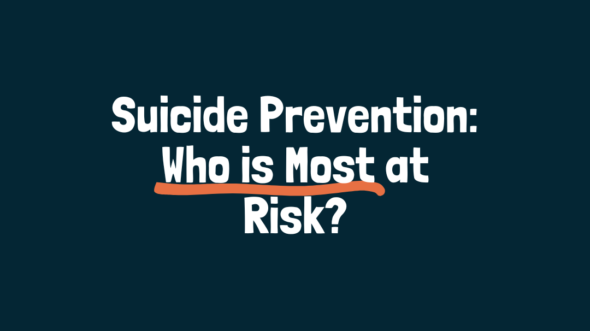Suicide Prevention: Who is Most at Risk?
15 August 2024

15 August 2024

In our line of work, we often hear the phrase, “Suicide doesn’t discriminate,” but this statement is not entirely accurate.
It is of course well-intentioned, but what people are trying to say is that suicide can affect anyone, which is entirely correct. It is not immune to social status, a loving family, physical strength, wealth, or any other factor.
However the sad reality is that certain groups are more at risk than others, and understanding these vulnerabilities is crucial to our efforts in preventing suicide.
According to the statistics, these are the groups most at risk:
Men, Particularly Middle-Aged
One of the most at-risk groups is men, particularly those aged 40 to 49.
In the UK, men are three times more likely to die by suicide than women. The reasons behind this alarming statistic are complex, involving factors such as societal expectations around masculinity, reluctance to seek help, and issues related to employment, relationships, and mental health.
People in Deprived Areas
Geographical location and socioeconomic status also play significant roles. Individuals living in deprived areas, including parts of the North East, are more likely to experience mental health challenges and, tragically, are at a higher risk of suicide.
The lack of access to mental health services, combined with financial stress and social isolation, exacerbates these risks.
Young People and Self-Harm
Young people are another vulnerable group, with self-harm being a significant indicator of suicide risk.
Mental health issues among teenagers and young adults have been rising, often linked to pressures from education, social media, and a lack of support systems.
It’s critical that we address these issues early and provide young people with the help they need.
LGBTQ+ Community
Members of the LGBTQ+ community also face a higher risk of suicide, driven by factors such as discrimination, bullying, and lack of acceptance.
The mental health challenges within this group are often compounded by societal stigma, making it even more difficult for individuals to seek support.
Our Commitment
At our charity, we are committed to providing education and support to prevent further tragedies. If you work with any of these groups of people we’d love to hear from you to see if we can work together to prevent suicide in our region.
We believe that by acknowledging the disparities in suicide risk and addressing them head-on, we can make a meaningful difference.
Follow us on Social Media.

Subscribe for the latest newsletter updates.